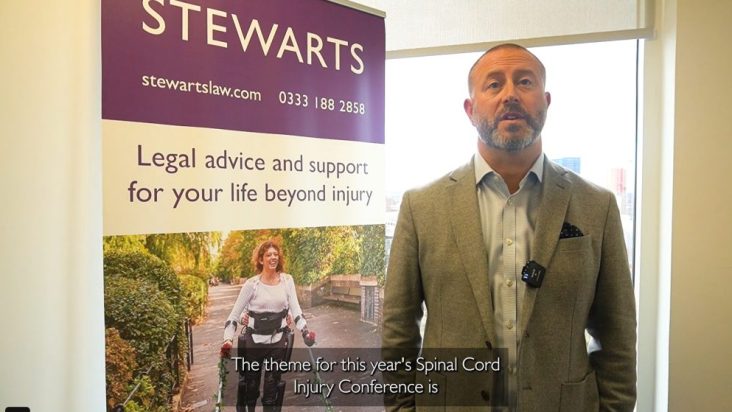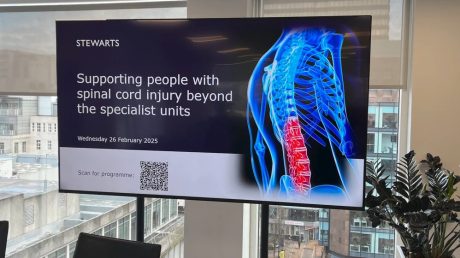On 26 February 2025, Stewarts hosted its inaugural conference dedicated to issues related to Spinal Cord Injury (SCI), with a focus on supporting people with SCI beyond the use of dedicated specialist units.
The majority of people who sustain a spinal cord injury are not treated at one of the major spinal units in the UK. This is in part because incidence of SCI has increased in line with the UK’s increasing population; the average age of people with SCI has also risen and more people are surviving such injuries, yet the number of specialist SCI beds has stayed relatively constant over the years. Studies suggest that only a third of people who sustain SCI receive acute treatments and rehabilitation at specialist centres, which presents significant problems for patients and the NHS.
Attendees at the Stewarts Spinal Cord Injury Conference 2025 considered the challenges arising from this issue and discussed various approaches adopted by different trusts and disciplines around the country. Watch the video below for highlights from the conference, accompanied by summaries of the speakers’ presentations.
Watch the conference highlights video below

Conference speakers and topics discussed
Alison Lamb (Consultant Nurse in Spinal Injuries, Midlands Centre for Spinal Injuries, NHS Foundation Trust)
Alison kicked off for the day with her insightful take on the issue of numbers of patients far outweighing the availability of beds in specialist spinal cord injury centres (SCICs). Alison acknowledged that patients are now facing a 10-12 week wait before admission to a SCIC; a very long time bearing in mind the first weeks following SCI are so crucial.
Alison discussed the integrated model of care adopted in the Midlands, created by a partnership of spinal surgeons, SCICs and the National Clinical Reference Group. The aim of the model is to embed SCICs within existing networks to encourage closer working and expand the remit of the current outreach services. Attendees found it incredibly interesting to consider this model in the context of provision within their own trusts.
Joanna Armstrong (Specialist Physiotherapist, National Spinal Injuries Centre, Stoke Mandeville Hospital)
Joanna discussed her experience of working within the pan-London model of spinal cord injury link workers and bladder/bowel nurses, who support SCI patients without access to an inpatient pathway.
Link workers have proven crucial to those who are not admitted to SCICs or are repatriated to their local hospital very quickly. They provide training and education on some of the most worrying issues for patients, including bladder, bowels and sexual function. Their efforts have led to patients achieving greater self-efficacy in managing their own conditions and a reduction in anxiety.
Kevan Baker OBE, WheelPower chairman and former Paralympic athlete
Kevan delivered a perceptive keynote speech that reflected upon his first-hand experience of the most common challenges for patients following acute care for SCI. He acknowledged the capacity issues within SCICs and discussed the “flow” of a spinal centre including the inputs, actions and outcomes. Kevin explored his view as to the most significant issue of “bed blocking” and the reasons it has been such a persistent problem.
Jane Stanbridge (Neurogenic Specialist Nurse, JPEL Training Ltd)
Jane expertly discussed bladder and bowl management after SCI. This is a crucial area: poor management can impact upon many aspects of a person’s life and lead to loss of confidence as well as a change of role in the family, ability to work full time, holidays and sexual practice amongst other concerns.
Having explored the symptoms of neurogenic bladder and bowel dysfunction, and emphasised the importance of having a proactive rather than a reactive approach to management, Jane examined the role of MDTs in achieving bladder/bowel goals and outlined the importance of compliance, competency and campaigns.
Cathie Bree Aslan (Tissue Viability Nurse, Wound Consultancy)
Delivering a fascinating presentation, Cathie dealt with why we continue to see so many pressure ulcers among SCI patients and the impact they have. She discussed management of ulcers in hospital and at home, and explored the different stages of pressure wound development. Cathie also highlighted the need to support staff in pre-empting problems, giving consideration to pressure redistribution equipment.
Panel session
The day rounded off with a fantastic and interactive session with our wonderful panel comprising:
- Gerard McDermott KC (Panel Chair)
- Martin Hibbert, Vice President of SIA
- Pradeep Thumbikat, Consultant Surgeon in Spinal Cord Injury Rehabilitation
- Jane Duff, Consultant Clinical Psychologist
- Michelle Emsley, Regional Spinal Cord Injury Clinical Lead, Nottingham University Hospitals NHS Trust
- Hugh Johnson, Partner in Stewarts’ Clinical Negligence team
With such diverse knowledge and expertise, the panel did not disappoint. They considered why patients are not accessing specialist rehabilitation or receiving sufficient psychological support. The discussion about how support for SCI patients could be expanded and improved, approaches adopted by other countries and the combination of clinical, legal and first-hand accounts left plenty for attendees to take away.
The participation by and questions from many of the attendees was a real highlight of the conference and made for an interesting, interactive and educational day.
Thank you to all who attended the Stewarts Spinal Cord Injury Conference 2025. Information about the next edition will be available in due course.
You can find further information regarding our expertise, experience and team on our Personal Injury pages.
If you require assistance from our team, please contact us.
Subscribe – In order to receive our news straight to your inbox, subscribe here. Our newsletters are sent no more than once a month.



